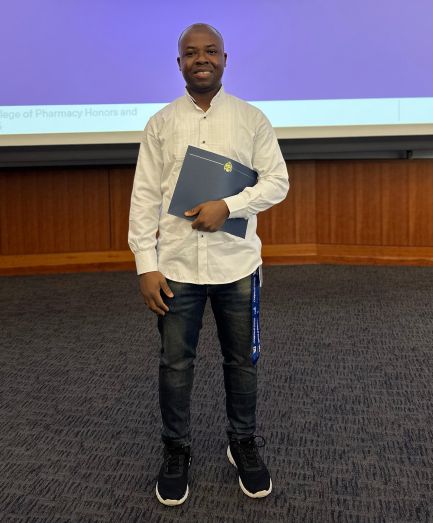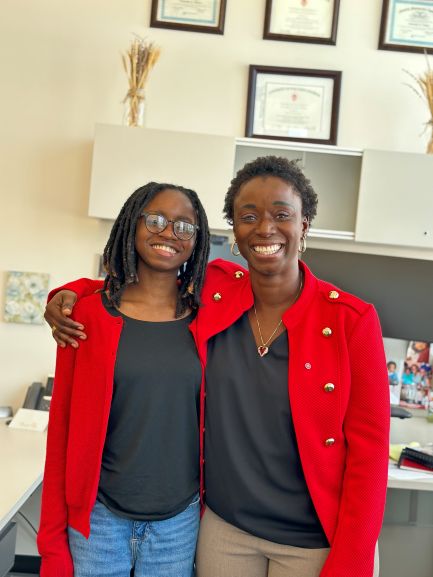CRoME Lab News
Upcoming Presentation - Translational Science 2026
Israel Sarpong-Adu, February 10, 2026
Association for Clinical and Translational Science (ACTS) hosts their Annual Meeting held at Milwaukee, Wisconsin, April, 2026!
We are proud to announce that second-year PhD Pharmaceutical Sciences Student Rasaq K. Oladapo, presents his abstract on 'Impact of a Pharmacist-Delivered Peer Educational Intervention on Buprenorphine Dispensing Behavior in Appalachian Kentucky' on Tuesday, April 21, 2026.
Upcoming Presentation - American Pharmacists Association (APhA) Annual Meeting 2026
Israel Sarpong-Adu, February 10, 2026
American Pharmacists Association (APhA) hosts their Annual Meeting and Exposition held at the Los Angeles Convention Center and the JW Marriott, California, March, 2026!
We are proud to announce that second-year PhD Pharmaceutical Sciences Student Rasaq K. Oladapo, presents his abstract on 'Naloxone Prescription Following Non-Fatal Opioid Poisoning Among Medicaid Beneficiaries'. His abstract has been awarded a podium presentation, reflecting the rigor and impact of his scholarly work.
Upcoming Presentation - American Pharmacists Association (APhA) Annual Meeting 2026
Israel Sarpong-Adu, February 10, 2026
American Pharmacists Association (APhA) hosts their Annual Meeting and Exposition held at the Los Angeles Convention Center and the JW Marriott, California, March, 2026!
We are proud to announce that second-year Doctor of Pharmacy Student and protégé of Dr. Abraham, Oluwatobiloba Deborah Onajin presents her abstract on 'Evaluating the Impact of Gospel Afrobeat dance MEdicine (GAME) Intervention on the Health of Children and Adults'. Her abstract has been awarded a podium presentation, reflecting the rigor and impact of her scholarly work.
Upcoming Presentation - American Pharmacists Association (APhA) Annual Meeting 2026
Israel Sarpong-Adu, February 10, 2026
American Pharmacists Association (APhA) hosts their Annual Meeting and Exposition held at the Los Angeles Convention Center and the JW Marriott, California, March, 2026!
We are proud to announce that third-year Doctor of Pharmacy Student, Sophia W. Li presents her abstract on 'Self-Reported Opioid Use and Disposal Among Adolescents and Young Adults After Tooth Extraction' on Saturday, March 28, 2026.
Presentation Update - Academy Health
Israel Sarpong-Adu, February 10, 2026
Academy Health hosted the 18th Annual Conference on the Science of Dissemination and Implementation in Health, held December 14-17 in National Harbor, MD.
Olufunmilola Abraham PhD, MS, BPharm discussed about the 'Implementation of Gospel Afrobeat Dance is MEdicine (GAME) Program in Community Settings'. This presentation reflects CRoME Lab’s continued engagement in impactful, evidence‑driven, community-engaged research.
New Publication: Social engagement moderates the relationship between cognitive functioning, depressive symptoms, and restless sleep in older black adults
Israel Sarpong-Adu, January 22, 2026
INTRODUCTION: Older Black adults face higher dementia risk, but it is unclear whether social engagement offsets the effects of depression and restless sleep. METHODS: We analyzed 1,905 Black adults aged 50+ from the 2016-2020 Health and Retirement Study (HRS). Linear mixed-effects models tested how depressive symptoms, restless sleep, and social engagement predicted baseline cognition and cognitive decline. RESULTS: Higher depressive symptoms and restless sleep were associated with lower baseline cognition (about 0.2 and 0.5 points lower) and faster decline (β×time ≈ −0.07 and −0.05). Greater social engagement predicted higher baseline cognition (about 0.6 points higher) and slower decline (β×time ≈ 0.08). Social engagement also buffered the negative effects of depressive symptoms and restless sleep on cognitive decline but did not affect their baseline associations. DISCUSSION: Social engagement may help older Black adults preserve cognitive health despite depression or poor sleep through accessible community, religious, and volunteer activities. HIGHLIGHTS: Depressive symptoms and restless sleep independently predicted poorer baseline cognition and faster cognitive decline among older Black adults, underscoring their distinct and additive roles in late-life neurocognitive vulnerability. Higher social engagement, measured through volunteering, religious participation, and group involvement was associated with better cognitive functioning and slower decline across three Health and Retirement Study (HRS) waves, even after full adjustment for demographic, socioeconomic, and health covariates. Interaction effects showed that social engagement buffered the adverse cognitive effects of both depressive symptoms and restless sleep, indicating its role as a behavioral resilience factor in aging. Culturally embedded forms of engagement, particularly faith-based and community-centered participation, emerged as salient protective pathways that align with existing social practices within Black communities. Findings highlight the potential of community and faith-based interventions to mitigate disparities in cognitive aging and to promote culturally meaningful strategies for sustaining brain health in older Black adults.
New Publication: Implementation of the Wonders of Pharmacy to engage high school students in the pharmacy profession
Israel Sarpong-Adu, December 3, 2025
Implementation of the Wonders of Pharmacy to engage high school students in the pharmacy profession
BACKGROUND: Enrollment in pharmacy programs has been declining, with no single explanation for the trend. Rising tuition costs amid wage stagnation, reduced interest in pharmacy careers, program oversaturation, and limited mentorship for applicants have been suggested to be contributing factors to this. To address this, initiatives such as pharmacy summer camps have emerged, aiming to engage high school students and boost awareness and enthusiasm for the profession, showing promising results in increasing interest. OBJECTIVE: To examine feedback from high school student attendees and presenters about their perceptions of the Wonders of Pharmacy (WoPh) event to steer for future implementation. METHODS: An innovative community engagement and leadership project was implemented in a first year required pharmacy course. The project involved student creation of interactive stations to be showcased at the WoPh event to demonstrate the role of pharmacists to high school students and their families. Two surveys were distributed via Qualtrics following the WoPh event: a 30-item survey to attendees and an 18-item survey to student presenters. Descriptive statistics were used to quantify and identify trends. Thematic analysis was used for open-ended questions. RESULTS: The WoPh event included a total of 108 attendees and 34 interactive stations facilitated by 130 student presenters. Attendee survey responses (20.3% response rate) indicated that while 85% felt they formed positive connections with pharmacy students, only 57% felt the same way with connections with pharmacists. Among presenters (34.6% response rate), 88% believed the event showcased various aspects of the pharmacy profession, but only 37% thought it was well organized and 33% found the networking opportunities valuable. Key themes from first-year student presenters included engagement and impact on high school students and the challenges and rewards of participation. CONCLUSION: The WoPh event introduced high school students and their families to pharmacy careers, fostering positive connections and interest in pharmacy careers. First-year PharmD students found the integration of the WoPh event in their required pharmacy course provided valuable insight for high school students and their families. However, PharmD students found that the integration of WoPh event into the course curriculum was disorganized. Addressing gaps in event organization and networking opportunities could further enhance this impactful educational event in the future.
New Publication: Pharmacists' Perspectives on Providing an Educational Intervention to Address E-cigarette Use and Vaping among Adolescents and their Parents
Israel Sarpong-Adu, November 14, 2025
Dr. Abraham’s recent publication in the Journal of the American Pharmacists Association (JAPhA) entitled “Pharmacists' Perspectives on Providing an Educational Intervention to Address E-cigarette Use and Vaping among Adolescents and their Parents” was featured in Pharmacy Today in the October 2025 (Volume 10, Number 31, Page 2).
New Publication: A Comparison of Machine Learning Models for Colon Cancer Survival Estimation
Sydney Thao November 7, 2025
A Comparison of Machine Learning Models for Colon Cancer Survival Estimation
BACKGROUND: Colon cancer is a leading cause of cancer-related deaths worldwide, and survival outcomes are influenced by a variety of factors, including biological traits, treatment type, and patient characteristics. Traditional statistical models, such as Kaplan-Meier curves, have been widely used to estimate survival probabilities. However, these models often have difficulty handling complex interactions, covariates, and non-linear relationships between risk factors. Recently, machine learning techniques have emerged as promising tools for improving survival prediction by handling large covariates and capturing complex patterns. OBJECTIVE: This study compares several machine learning (ML) models to accurately estimate colon cancer survival by leveraging data from the Kentucky Cancer Registry (KCR). By identifying key risk factors, these analyses aims to improve risk stratification, treatment planning, and prognosis for overall colon cancer survival and within subgroups. METHODS: This retrospective study examines registry data to compare a variety of predictive modeling techniques, including Cox proportional hazards, accelerated failure time (AFT) models, random survival forests, Lasso, and Elastic Net, which were applied to the registry data to predict survival probabilities. The models were evaluated based on their predictive accuracy, feature importance, and ability to handle complex risk factors. RESULTS: Key covariates influencing survival outcomes, such as age, treatment type, positive nodes, tumor stage, smoking, and comorbidities, were identified as significant predictors of survival. The results highlight the strengths and limitations of each machine learning approach, with the random forest and Lasso models outperforming traditional methods in terms of prediction accuracy and identifying non-linear relationships. CONCLUSIONS: This comparative analysis offers valuable insights for clinical decision-making and prognosis, highlighting the potential of machine learning to identify risk factors specific to different subgroups, ultimately advancing personalized care for colon cancer patients.
New Staff: Dr. Olumuyiwa Moses Desmennu
Sydney Thao October 17, 2025
Dr. Olumuyiwa Moses Desmennu has interdisciplinary training in biochemistry, research management, and evaluation. He holds a postdoctoral research scholar in the CRoME Lab at the University of Kentucky College of Pharmacy.
New Publication: Leveraging Machine Learning Models to Explore Disparities in Prostate Cancer Diagnosis, Treatment, and Survival
Sydney Thao October 17, 2025
INTRODUCTION: Prostate cancer (CaP) is the second most common cancer in men globally and a leading cause of cancer-related mortality, particularly among older men. In the United States, disparities in incidence, stage at diagnosis, and outcomes persist across racial, socioeconomic, and geographic lines. Men in medically underserved regions like Appalachia experience higher mortality due to limited access to timely screening and treatment. Given the complex interplay of clinical, behavioral, and sociodemographic factors, machine learning (ML) offers promise in identifying survival predictors that traditional models may overlook. This study applies ML models to assess the impact of age at diagnosis, treatment modality, and other sociodemographic and clinical factors on CaP survival outcomes using data from the Kentucky Cancer Registry (KCR). METHODS: We retrospectively analyzed 37 893 CaP cases diagnosed from 2010 to 2022 using KCR data linked to mortality records. Kaplan-Meier (KM), Random Survival Forest (RSF), and Elastic Net regression were used to estimate survival, assess variable importance, and evaluate predictive performance. Missing data were handled via multiple imputation, and leave-one-out cross-validation minimized overfitting. Models were compared using out-of-bag error, continuous ranked probability scores (CRPS), and interpretability. RESULTS: ML models identified age at diagnosis, treatment modality, and smoking status as the top survival predictors. RSF showed that age was approximately 2.5 times more influential than treatment type. Patients diagnosed before age 60 were more likely to undergo surgery and had lower mortality, while older men more often received non-surgical therapies and experienced worse outcomes. Insurance status, tumor grade, lymph node involvement, and marital status also affected survival, with pronounced disparities among uninsured and government-insured patients. CONCLUSIONS: ML models highlighted age, smoking, and treatment type as key predictors of CaP survival. Findings support early screening, equitable treatment access, and behavioral health integration to reduce disparities in high-risk areas such as Kentucky and Appalachia.
New CRoME Lab member!
Sydney Thao August 27, 2025
Emily will be joining our lab starting September 2025 as our community engagement specialist. She will assist with our work with various community partners to develop creative solutions to improve health outcomes, medication use, and patient safety. Educating communities and providing opportunities to incorporate healthy lifestyle choices are methods used by the CRoME Lab to generate positive public health impact by reaching populations across the lifespan. Emily will assist the CRoME Lab research team to engage with established community partners, as well as new partners, in Kentucky to implement interventions that are designed to meet the community’s needs and are evaluated by measuring outcomes that demonstrate community sustainability and improved knowledge, attitudes, medication use, patient safety, and health behaviors.
New Publication about the development of Mooving Cows, a digital tool for practicing appropriate cow handling
Sydney Thao July 24, 2025
Engaging dairy farming stakeholders in developing the Mooving Cows digital tool for practicing appropriate cow handling
BACKGROUND: Appropriate handling of dairy cows improves animal welfare and milk production and reduces the risk of injury to cows and people. However, safely interacting with cows requires training to understand their natural behavior. OBJECTIVE: Our objective was to develop, in collaboration with Wisconsin dairy farming stakeholders, an innovative tool for dairy farm staff to practice appropriate cow handling. METHODS: We created and evaluated a prototype of Mooving Cows, a digital touchscreen game in which players practice moving cows in simulated dairy farm environments. The learning objectives were to understand how human actions affect safety and cow behavior, stress, and productivity. We conducted focus groups with dairy farm staff (3 groups in Spanish, n = 16; 2 groups in English, n = 4) and 3 English focus groups with decision-makers (n = 10) such as farm owners and managers, bilingual consultants, and veterinarians. First, the focus group participants completed questionnaires about their experiences with and perceptions of cow handling and professional training and then they played the game prototype individually. RESULTS: On average, participants indicated they felt fairly comfortable using mobile applications (scale: 1 = very comfortable, 5 = very uncomfortable; farm staff: 1.9 ± 1.2, mean ± SD, range = 1 to 5; decision-makers: 1.8 ± 1.0, range = 1 to 4). After playing the game prototype, participants engaged in recorded, facilitated discussions about their qualitative impressions of the game. The research team reviewed the transcriptions to identify action items for improving the final version of the game, then conducted an inductive codebook thematic analysis to summarize themes relating to the participants' impressions of the game. We incorporated participants' feedback into version 1.0 of the game and compiled their ideas for future versions of the game. CONCLUSION: Overall, participants indicated the game was entertaining and would be useful for job training, particularly for new hires with little cow-handling experience. The results from the qualitative evaluation of the game prototype by dairy farming stakeholders suggest that the game could be a relevant way for farm staff, especially new hires, to remain current with national standards and expectations for continuing education.
Check out our New Publication about Adolescents and Parents using MedSMA℞T Families in the Emergency Department!
Sydney Thao July 02, 2025
Adolescents’ and Parents’ Perspectives on Using the MedSMARxT Families Intervention in Emergency Departments for Opioid Medication Safety Education: Mixed Methods Study
BACKGROUND: The opioid crisis has significantly impacted adolescents and their families. This is attributed in part to increased opioid prescriptions in pediatric emergency departments (EDs) due to acute pain conditions and injuries. Although EDs frequently prescribe opioids, no effective preventative interventions have been implemented to educate adolescents and their families on safe opioid use. This study evaluates the MedSMA℞T Families intervention, which consists of an engaging serious game, Adventures in PharmaCity, and a personalized Family Medication Safety Plan (FMSP) with the aim of reducing opioid misuse and promoting opioid medication safety. The MedSMA℞T Families intervention was developed to educate adolescents and adults prescribed opioids on safe practices such as opioid storage and disposal. OBJECTIVE: This study aimed to explore and characterize adolescents’ and parents’ experiences and perspectives on implementing the MedSMA℞T Families intervention in the ED to improve opioid education and safety among adolescents. METHODS: A total of 93 participants, including 16 children and 77 parents, were recruited from the pediatric ED at a tertiary academic hospital to play the MedSMA℞T game in the ED. A total of 16 participants, including 8 children and 8 parents, were followed up with interviews to gather qualitative feedback. Participants engaged with the MedSMA℞T game—Adventures in PharmaCity—and the FMSP. Data were collected through gameplay observation and 75-minute semistructured interviews via Zoom. Quantitative in-game data were analyzed using descriptive analysis and qualitative data were analyzed using thematic analysis with NVivo (version 14; Lumivero). RESULTS: Parents spent an average of 22.16 (SD 4.97) minutes playing the game, while children spent an average of 21.99 (SD 8.06) minutes. Families appreciated the game’s design and noted usability challenges and suggested enhancements for clearer gameplay instructions. Participants reported increased knowledge of opioid safety, highlighted the importance of communication with health care providers, and a desire for a mobile app to assist with medication management. The FMSP was perceived as valuable for promoting awareness of safe practices and connected well to the knowledge gained from the game. CONCLUSIONS: The MedSMA℞T Families intervention was well received as a beneficial educational tool to educate adolescents and their families on safe opioid use. Additionally, it highlights a clear need for more accessible digital tools to increase opioid education. This feedback indicates a strong interest in improving educational resources to ensure safe opioid management within families.
Check out our New Publication about Pharmacists' Perspectives on an E-Cigarette Educational Intervention!
Sydney Thao March 28, 2025
Pharmacists’ Perspectives on Providing Educational Intervention to Address E-Cigarette Use and Vaping among Adolescents and Their Parents
BACKGROUND. The use of newer forms of nicotine, such as e-cigarettes, has become popular among youth, creating a growing concern about its health impact on adolescents. As the adolescent vaping epidemic persists, it is necessary to engage all public-facing healthcare professionals in prevention and reduction efforts against e-cigarette use. With pharmacists being the most accessible health care professional, they are well-suited to expand their tobacco services to include vaping. OBJECTIVE. The objectives of this study are to examine pharmacists’ opinions on the potential role they may have in addressing adolescent vaping and to determine pharmacists’ view on a proposed educational tool (Ph-EVER) for adolescents and parents to learn more about vaping and e-cigarette use. METHODS. Licensed and practicing pharmacists in Wisconsin were recruited via pharmacy organizations’ email listservs to take part in a semi-structured interview. The interview questions covered knowledge on adolescent vaping, the role of pharmacists in addressing adolescent vaping, interactions with adolescents in their practice, and feedback on the Ph-EVER. Two study team members independently coded the interviews to generate prevalent themes and subthemes. RESULTS. In this study, 30 pharmacist participants were interviewed. From their interviews, themes that emerged included how pharmacists interact with teens, what they already know about e-cigarettes, the potential roles pharmacists may have on adolescent vaping, and feedback on the Ph-EVER. CONCLUSION. Pharmacists can be key professionals in reducing adolescent vaping; however, they lack knowledge on the topic of e-cigarettes, indicating the need for continuing education. Many pharmacists noted that they rarely see adolescents in their practice setting, making adolescents a difficult population to reach. Pharmacists were open to the idea of implementing the Ph-EVER within their pharmacy stating it achieved its intended purpose. Recommendations were made to expand this resource to social media to target the adolescent population.
Upcoming Presentation - American Association of Colleges of Pharmacy (AACP) Meeting 2025
Sydney Thao March 26, 2025
American Association of Colleges of Pharmacy (AACP) hosts the Pharmacy Education 2025, held on July 19-22 in Chicago, IL.
Olufunmilola Abraham PhD, MS, BPharm will be discussing about the Implementation of the Wonders of Pharmacy to Engage High School Students in the Pharmacy Profession.
Upcoming Presentation - Translational Science 2025
Sydney Thao March 26, 2025
Association for Clinical and Translational Science (ACTS) hosts the Translational Science 2025, held at the Washington Hilton in Washington, D.C. from April 14–17, 2025.
Olufunmilola Abraham PhD, MS, BPharm, Motolani E. Adedipe (nee ogunsanya) DPh, PhD, and Ejura Yetunde Salihu PhD will be discussing Community Advisory Boards: A Model for Promoting Health Equity and Engagement in Research among Communities of Color.
Upcoming Presentation - Misdiagnosing a Continent: Perceptions of Africa in Global Health
Sydney Thao March 26, 2025
Misdiagnosing a Continent: Perceptions of Africa in Global Health | International Center
The Office of Global Health Initiatives presents a panel discussion centered on perceptions of global health in Africa on Apr 2, 2025, 1:00 – 2:00 PM in the College of Nursing Room 115. Panelists include:
- Olufunmilola Abraham PhD, MS, BPharm from the Department of Pharmacy Practice and Science discussing about Nigeria
- Tshepang Tshube PhD from the Department of Kinesiology and Health Promotion, Sports Psychology discussing about Botswana
- Meriem Bensalem-Owen MD, FANA, FACNS, FAES from the Department of Neurology discussing about Algeria
Check out our New Publication about Emergency Department Staff's Perspectives on MedSMA℞T Families!
Sydney Thao March 05, 2025
Using MedSMA℞T Families for Opioid Safety Education: Emergency Department Staff Perspective
OBJECTIVES. Misuse of opioid medications was associated with 75% of drug-related deaths in 2020. Although Emergency Departments (EDs) frequently prescribe opioids, no preventative interventions have been implemented to educate adolescents and their families on safe opioid use. This study aimed to characterize ED staff’s perspectives on implementing the MedSMA℞T Families intervention in the ED to improve opioid education and safety among adolescents. METHODS. ED staff played the MedSMA℞T game, completed a survey, and were asked open-ended questions regarding their experience interfacing with the technology. Transcripts were coded using NVivo to conduct content analysis. The analysis integrated the Systems Engineering Initiative for Patient Safety (SEIPS) 3.0 model into the intervention. RESULTS. A total of 23 ED staff were recruited. Staff reported that the game was more interactive and age-appropriate for adolescents compared to other educational materials in the ED. Reflecting on the care team, nurses and child life specialists were identified as appropriate roles for delivering the game to patients. Moreover, staff buy-in, training, and ED workflows were recognized as important factors within the organizational conditions allowing for game implementation. Space, loudness, and allocated resources in the ED were perceived as challenges to game implementation. Lastly, waiting room gameplay was thought to be the most efficient setting of game implementation. CONCLUSIONS. MedSMA℞T Families can be efficiently implemented into ED settings. It is one of the first serious games to target opioid education and to engage and better retain the attention of younger patients and was well received by ED staff.






